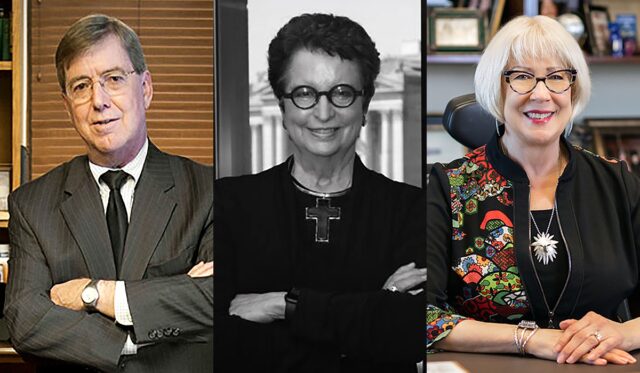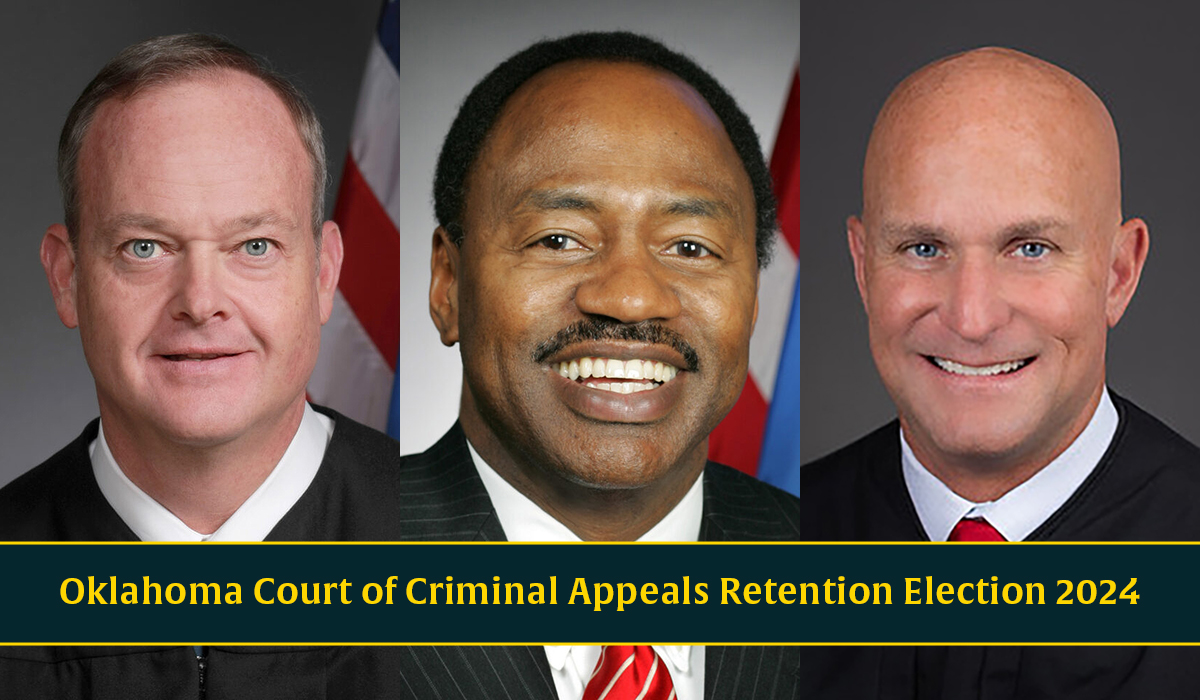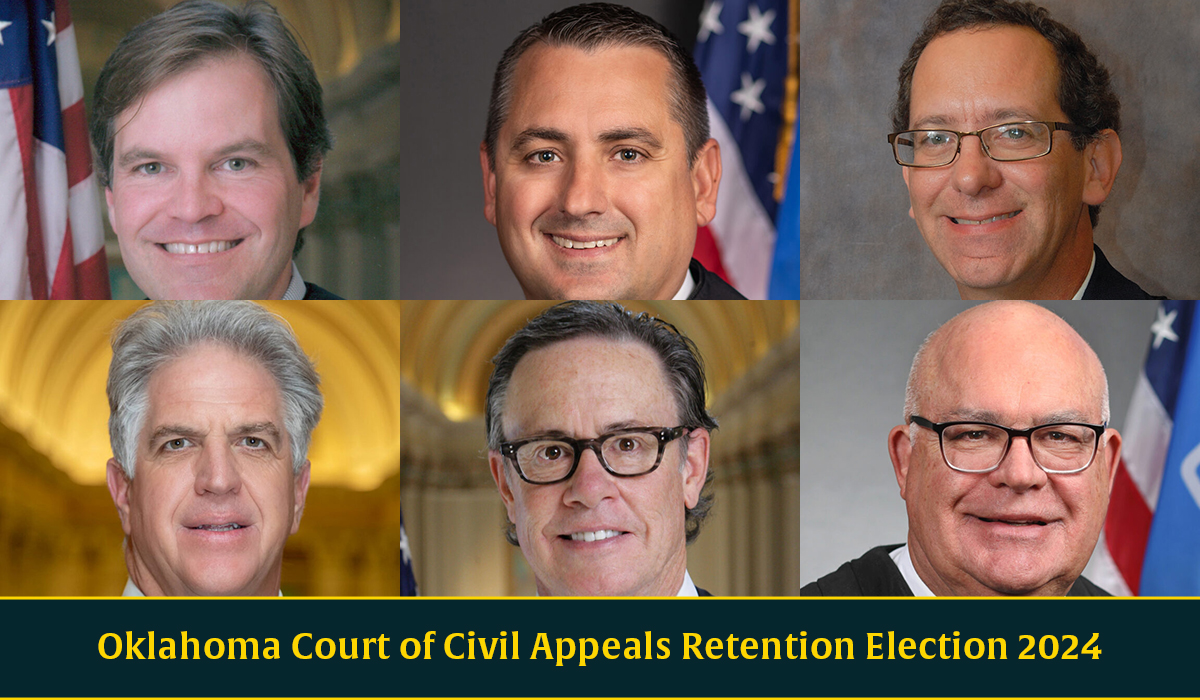
For the first time in state history, an Oklahoma Supreme Court justice lost her judgeship at the ballot box Tuesday.
Of about 1.44 million votes cast, only 49.76 percent were in favor of retaining Justice Yvonne Kauger, just shy of the simple majority the 87-year-old needed to keep her seat on Oklahoma’s highest civil court. Born in 1937, Kauger was appointed to her position in 1984 by Gov. George Nigh, making her the longest-tenured justice currently on the court and the third-longest tenured justice in the court’s history.
Justice James Edmondson, 79, and Justice Noma Gurich, 72, also appeared on Tuesday’s ballot, but they retained their judgeships, earning 51.01 percent support and 50.26 percent support for their retention, respectively.
No appellate judge, on the Oklahoma Supreme Court or the state’s other appeals courts, had ever been voted out in a retention election before Kauger. Such elections are typically quiet, with judges restrained from undertaking many campaign activities, but PAC-backed ad campaigns broke that norm for the Supreme Court justices up for their six-year retention consideration Tuesday.
People for Opportunity launched an ad campaign encouraging voters to vote “No” on retaining Kauger, Gurich and Edmondson, characterizing them as “activist liberal judges.” Supported by Gov. Kevin Stitt, another PAC called 46 Action also aired an ad attempting to tie the justices to Vice President Kamala Harris. On the flip side, a PAC called Protect Our Freedoms encouraged voters to retain the justices, praising the Supreme Court’s majority decision that held a proposed Catholic charter school would violate the state and federal constitutions.
View full results
Online results are unofficial until they are certified by the Oklahoma State Election Board.
Edmondson, Kauger and Gurich all earned significantly lower percentages of the vote compared to the last time they were up for retention. In their previous election in 2018, Kauger received 62.19 percent support. Gurich received 61.57 percent support that year, while Edmondson received the least support with a 59.4 percent finish. (That year, Edmondson’s brother, Drew, was the Democratic nominee for governor.)
“The retention system was designed to prevent corruption after the Supreme Court scandals, and to remove politics from the election. It has been an excellent system for decades. Nevertheless, it leaves us helpless to defend ourselves,” Kauger said in October. “I am saddened and alarmed that the system is being used to attack the independent judiciary based on dissatisfaction with a few specially selected opinions.”
Originally from Colony in Washita County, Kauger is an avid art aficionado. Despite her voter-mandated departure from the court, she is unlikely to venture far from the Oklahoma Judicial Center, as she lives across the street.
To determine Kauger’s replacement on the Oklahoma Supreme Court, a 15-member private body called the Judicial Nominating Commission will accept applications and then whittle a list of candidates down to three. Those three recommendations will be submitted to the governor, who will then appoint Kauger’s successor. Supreme Court justices appear on the ballot for retention every six years. According to Title 20, Section 3, Kauger’s term is set to conclude on the second Monday in January, which will be Jan. 13.
In 2026, two more members of the Oklahoma Supreme Court — Justice Richard Darby and Chief Justice M. John Kane IV — are scheduled to face retention elections. In addition to hearing cases, the Supreme Court is responsible for the administration of Oklahoma’s court system, which is facing a general shortage of court reporters and a long-delayed need for electronic filing access.
Three judges retained on Court of Criminal Appeals

Three of the five judges in the Oklahoma Court of Criminal Appeals were also on the retention ballot Tuesday, and all three were retained. The Court of Criminal Appeals is Oklahoma’s highest criminal court, and it has exclusive appellate jurisdiction over criminal cases, leaving civil cases to the Supreme Court, which has the ultimate authority to decide which cases do and do not fall under its jurisdiction. Among the responsibilities of the Court of Criminal Appeals is to review every death sentence.
The three judges retained Tuesday were:
- David Lewis, 66, was retained with 59.11 percent of the vote. He was nominated to his position by Gov. Brad Henry in 2005;
- William Musseman, 52, was retained with 64.3 percent of the vote. He was nominated to his position by Gov. Kevin Stitt in 2022;
- Scott Rowland, 59, was retained with 63.71 percent of the vote. He was nominated to his position by Gov. Mary Fallin in 2017.
The other two judges on the Court of Criminal Appeals, Robert Hudson and Gary Lumpkin, are set to be up for retention in 2026.
Six judges retained on Court of Civil Appeals

The 12-judge Court of Civil Appeals is Oklahoma’s largest appellate court. It serves as an intermediate court whose decisions may be appealed to the state’s Supreme Court. Half of its judges were up for retention Tuesday. The six judges who secured further service were:
- Robert “Bobby” Bell, 56, was retained with 58.75 percent of the vote. He was nominated to his position by Gov. Brad Henry in 2005;
- Timothy Downing, 45, was retained with 64.99 percent of the vote. He was nominated to his position by Gov. Kevin Stitt in 2022;
- Brian Jack Goree, 64, was retained with 59.29 percent of the vote. He was nominated to his position by Gov. Mary Fallin in 2012;
- Jim Huber, 56, was retained with 64.53 percent of the vote. He was nominated to his position by Stitt in 2023;
- E. Bay Mitchell, 69, was retained with 61.55 percent of the vote. He was nominated to his position by Gov. Frank Keating in 2002;
- Thomas Prince, 67, was retained with 64.56 percent of the vote. He was nominated to his position by Stitt in 2020.
Court of Civil Appeals judges Deborah Barnes and Jane Wiseman are set to be up for retention in 2026. Judges Gregory Blackwell, John Fischer, Stacie Hixon and Barbara Swinton are scheduled to be up for retention in 2028.






















